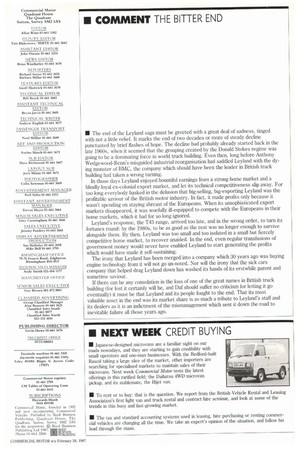• COMMENT THE BITTER END
Page 5

If you've noticed an error in this article please click here to report it so we can fix it.
• The end of the Leyland saga must be greeted with a great deal of sadness, tinged with not a little relief. It marks the end of two decades or more of steady decline punctuated by brief flashes of hope. The decline had probably already started back in the Late 1960s, when it seemed that the grouping created by the Donald Stokes regime was going to be a dominating force in world truck building. Even then, long before Anthony Wedgewood-Benn's misguided industrial reorganisation had saddled Leyland with the dying monster of BMC, the company which should have been the leader in British truck building had taken a wrong turning.
In those days Leyland enjoyed bountiful earnings from a strong home market and a blindly loyal ex-colonial export market, and let its technical competitiveness slip away. For too long everybody basked in the delusion that big-selling, big-exporting Leyland was the profitable saviour of the British motor industry. In fact, it made profits only because it wasn't spending on staying abreast of the Europeans. When its unsophisticated export markets disappeared, it was woefully ill-equipped to compete with the Europeans in their home markets, which it had for so long ignored.
Leyland's response, the T45 range, arrived too late, and in the wrong order, to turn its fortunes round: by the 1980s, to be as good as the rest was no longer enough to survive alongside them. By then, Leyland was too small and too isolated in a small but fiercely competitive home market, to recover unaided. In the end, even regular transfusions of government money would never have enabled Leyland to start generating the profits which would have made it self-sustaining.
The irony that Leyland has been merged into a company which 30 years ago was buying engine technology from it will not go un-noted. Nor will the irony that the sick cars company that helped drag Leyland down has washed its hands of its erstwhile parent and sometime saviour.
If there can be any consolation in the loss of one of the great names in British truck building (for lost it certainly will be, and Daf should suffer no criticism for letting it go eventually) it must be that Leyland and its people fought to the end. That its most valuable asset in the end was its market share is as much a tribute to Leyland's staff and its dealers as it is an indictment of the mismanagement which sent it down the road to inevitable failure all those years ago.
















































































































